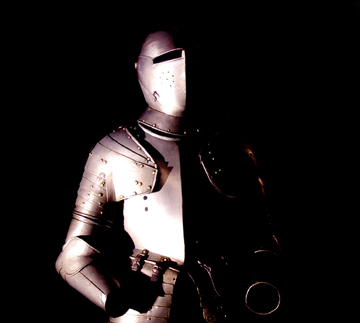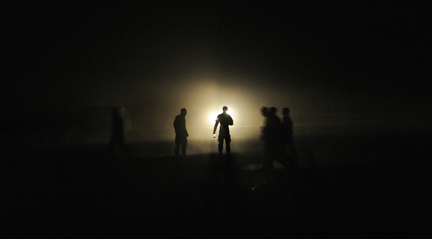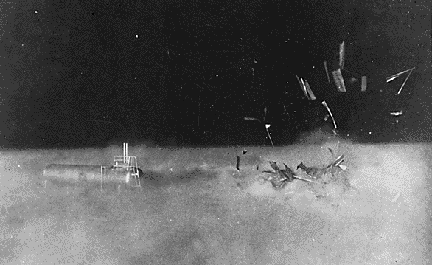The Kingdom of God is both an internal and external reality, the walls and ramparts of which need to be watched and guarded. Internally that kingdom is the heart of man. Externally it is the Church, the Christian family and, hopefully, an evangelized society. The protection of that larger external kingdom, however, depends on the transformation of individual hearts.
Holes are torn into the walls of the Church only because the sanctuaries of individual hearts have been breached. Even though the Church is a social, external reality that communicates supernatural life to individual souls, it has no life at all unless it is animated by the interior life of the Savior. During the itinerary of this life, the paradox remains that we cannot live without the grace of the Church, but the Church will not thrive unless we guard the grace within us. All of this depends on our connection with the Heart of Christ.
Heart to Heart Talk
We speak of the heart as though it was the whole person. For example, we personify Our Blessed Lord and His Mother in terms of their Hearts when we say: “Sacred Heart of Jesus, have mercy on us! Immaculate Heart of Mary, pray for us.” The heart represents the moral and spiritual center, source of unity, and principle of organization and life. It is, again, an internal reality. Just as the physical organ is literally at the center of the body, so as a symbol the heart represents all that is central to supernatural life, the interior life of prayer and union with God. It represents the highest part of man’s spirit that is most completely “transubstantiated” into the Trinitarian Communion by means of his cooperation with grace.
We freely personify the Hearts of Jesus and Mary, because the heart is also symbolic of an enclosed vessel in which all the treasure of life and grace are contained. The abundance of life, promised to us by the Lord himself, is nothing other than the fullness of His own life (cf. Jn 10:10). The fullness of grace by which the angel Gabriel names the Blessed Virgin is poured out for us in the mystery of the Incarnation and our own rebirth as children of God (Lk 1:28). At Fatima, for instance, Our Lady makes grace-filled promise to Lucia: “My Immaculate Heart will be your refuge and the way that leads you to God.”
By means of the Church that Christ established, there is an open path from the fullness of grace in Christ through Mary to the vessel of our own hearts. For those who have not yet found that grace, or who perchance, have lost it, the task is to make room, by casting out from the heart the refuse deposited there by the world, the flesh and the devil. This is the necessary prerequisite for receiving the sacraments worthily and fruitfully. For those have experienced that grace and seen it grown, unworthy though they are, their work is by no means over, for the Kingdom of God, which is the heart of man, is under constant attack.
Heart Attack
Spiritually, the enclosed space of our hearts is not protected by flesh and bone, but by the heavenly host and by the sword of the spirit (cf. Ep. 6:17). Our Lord warns us: Fear ye not them that kill the body, and are not able to kill the soul: but rather fear him that can destroy both soul and body in hell (Mt. 10:28). At the Cross, the enemy of hearts mockingly executes the transfixion of the Heart of Christ and the Soul of His Mother, believing falsely that in so doing he violated the very sanctum of the House of God. But in reality what he did was to open the floodgates of grace.
One of the paradoxes of the Cross is that the Hearts of Jesus and Mary secure the Kingdom of God by suffering and seemingly succumb to the assault of the enemy. But in reality to suffer is not to be conquered. For the enemy, death, shall be destroyed last (1 Cor 15:26), and even now in the death of Christ we are brought to life. The heart of man is protected, then, by incorporation into the mystery of the sacrificial love of Christ and the coredemptive love of the Immaculate.
Custody of the Heart

In The Soul of the Apostolate by Dom Jean-Baptiste Chautard (1858– 1935), we are counseled to practice custody of the heart, that is, to guard our hearts, by means of cultivating purity of intention and the practice of the presence of God. Religious people often find themselves “swarming like an anthill with venial sins,” or justifying their own tepidity with the righteous outrage about the state of the Church, society and “sinners,” because their deep motives for practicing religion are tainted by so much self-love and self-deception (part 5, section 4). How often do we need to stop and center ourselves on the Hearts of Jesus and Mary, begging for the strength to stay focused solely on them, to remain in their presence and to shut out every other voice to the contrary.
It is this vigilance of the heart, and only it, that brings about the rebuilding of the larger Kingdom of God. Dom Chautard makes little of grand schemes and apostolic gimmicks as means of appealing to the masses of modern men. Together with the Church he says that “God is a hidden God, Deus absconditus,” and that deep transformations among men take place by means of the revelation of that hidden supernatural character of holiness through those already so transformed. “How does this diffusion of the supernatural come about?” asks Dom Chautard:
It is the visible brilliance of sanctity, the shining-forth of that divine influx which theology commonly calls sanctifying grace; or, better still perhaps, we may say it is the result of the unutterable presence of the Divine Persons within those who They sanctify (part 4, section c.).
Radio-contemplative-active
Dom Chautard calls this effulgence of holiness “supernatural radiation.” By means of its blast wave, the enemies of the heart and of the Church are flung back to hell. Thus, real and effective vigilance on behalf of Christ’s Church and all the souls entrusted to Her care will always depend on the defenses of our own individual hearts.
Dom Chautard was a contemplative monk, who, at the behest of Holy Mother Church, left his monastery in order to conduct Church’s work of saving souls, but he was always so wary of allowing the ego to supplant the grace of Christ. May we never fall into that trap. May we, rather, remain vigilant in the custody of our hearts, which is the only way to place the fortification of grace around the larger, external Kingdom of God.
Posted in Blessed Virgin Mary, Catholic Action, Catholicism, Chivalry, Knights, Marian Chivalry, Prayers, Religion, Spirituality, Swordplay Tagged: Custody of the Heart, Dom Chautard, Fatima, Guarding the Heart, Heart, Hearts, Immaculate Heart, Kingdom of God, Sacred Heart, The Soul of the Apostolate







Fr. Angelo,
First, thank you for this excellent discourse-I found it very interesting as well as enlightening.
You note that “For those who have not yet found that grace, or who perchance, have lost it, the task is to make room, by casting out from the heart the refuse deposited there by the world, the flesh and the devil. This is the necessary prerequisite for receiving the sacraments worthily and fruitfully.” Could you please expound upon this statement? I guess I do not understand how to cast such things from the heart….what are some ways to do this?
Also, how does one stay vigilant in guarding their heart from the “enemies”; who are they and why do they still attack when victory was clearly won at the cross? I guess I am interested in the philosophical/theological reasonings behind this. Thank you for your time.
Leland
Leland,
What I mean by the worthy and fruitful reception of the sacraments being dependent on our own willingness to empty our hearts of the refuse of our sinfulness is essentially true contrition. Real sorrow for sin is not essentially an emotion but a firmness of our will to quit our sins and avoid their occasion, and in the case of sins against justice, to make restitution. I like to point out that the best way to go to confession is to take care of the problems as quickly as possible, preferably before we go to confession. For example, while a soul immersed in impurity through pornography would be well advised to seek a priest out even when they have no good resolution and still are immersed in the occasion of sin, it is better–much better–to get rid of the garbage first. That is a clear manifestation of true contrition and it is what “makes room” in our hearts for grace.
The enemies of the soul are the world, the flesh and the devil: the world, because of its enticements and our tendency to put created things before the Creator; the flesh, because of original sin, and especially because our lower nature tends to undermine our spiritual welfare unless we live a disciplined life; the devil, because he hates us and is bent upon our eternal death. In particular, in the context of my post, I am recommending purity of intention and the practice of the presence of God as the means of vigilance in the face of our enemies. We need to put our interior life before all else.
Fr.,
Thank you for your reply. It seems like a daunting task, particularly with all of the obstacles in the way…..and nevermind the devil and the flesh–this self-absorbed narcisstic society we live in seems to me to be the real enemy…where only the outer self is realized, tended, and worshiped…I would unfortunately have to say that a majority of society is internally dead and will stop at nothing until everyone is the same way in thought and action…what else could explain the proponderance (and tolerance) of abnormal societal behaviors that plaugue us now (e.g., abortion)? Obviously the devil and original sin have a role, as we are inherently weak and the devil hates us as you stated….but something else seems to be at play that is quickly causing the decay of our modern world. Scary to say the least…..glad I have Jesus and the Scriptures to help me find my way!!